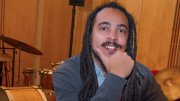“I follow sounds,” says percussionist-composer Jessie Cox, who joined Harvard last fall as an assistant professor of music. “For me, playing music, or finding a new sound, is about hearing something that was unthinkable.” That’s an apt statement. Cox’s compositions often feel like a leap into the unknown: wildly, playfully, disquietingly experimental, crossing genres and geographies and pushing the limits of what counts as an instrument. He’s interested in the sounds of extinct birds and the oral histories embedded in traditional drums. He once wrapped cotton around instruments’ strings to hear their whispering, hissing overtones. (Rubber bands, he found, elicit a bell-like sound.) A graduate of the Berklee College of Music and Columbia University, Cox began his music career at age three, when his mother enrolled him in solfège classes to learn rhythms and pitches after she noticed him hitting objects around the house just to hear the sounds they made. By age six, he was learning the djembe drum and writing music; at 12, he was playing in cover bands and studying with internationally acclaimed artists. He was also learning to navigate a different kind of cultural landscape, as a black child with roots in Trinidad and Tobago growing up in the bilingual Swiss city of Biel/Bienne. There’s no national conversation in Switzerland about race, he says, and no word for blackness. His exploration of the subject—mediated through music, including a piece about George Floyd by Nigerian-Swiss composer Charles Uzor—culminated in a book, Sounds of Black Switzerland: Blackness, Music, and Unthought Voices, published in April. When he’s not following sounds, he’s practicing bonsai. He enjoys its slowness, a contrast with music’s immediacy. “But,” he adds with a grin, “there is an ulterior motive which is musical: it would be very nice if the bonsai could someday become an instrument.”
Harvard Percussionist and Composer Jessie Cox
Harvard Percussionist and Composer Jessie Cox
An experimental percussionist-composer pushing the limits of music

Jessie Cox | Photograph by Stu Rosner
You might also like
Harvard’s Hasty Pudding Honors Rose Byrne
The Bridesmaids actress celebrated her 2026 Woman of the Year Award with a roast and a parade.
Harvard’s Hasty Pudding Toasts, Roasts Michael Keaton
The Batman actor was “encouraged as hell” by the students around him during the 2026 Man of the Year festivities.
How a Harvard and Lesley Group Broke Choir Singing Wide Open
Cambridge Common Voices draws on principles of universal design.
Most popular
Explore More From Current Issue

Inside Harvard’s Most Egalitarian School
The Extension School is open to everyone. Expect to work—hard.

How Stories Help Us Cope with Climate Change
The growing genre of climate fiction offers a way to process reality—and our anxieties.

Bees and Flowers Are Falling Out of Sync
Scientists are revisiting an old way of thinking about extinction.





